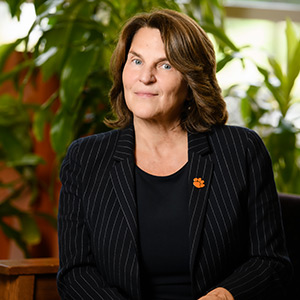- Academics
- Students
- Research
-
Centers & Institutes
- Centers & Institutes Overview
- Center for Addiction and Mental Health Research
- Center for Public Safety Research
- Center for Public Health Modeling and Response
- Center for Research on Health Disparities
- Clemson Rural Health
- Clinical Learning Research Center
- Human Factors Institute
- Institute for Engaged Aging
- Institute for Family and Neighborhood Life
- Institute for Parks
- Outdoor Lab
- Social Media Listening Center
- About
- Engagement
About the College

-
Mission | Vision | Goals
Mission
The mission of the College of Behavioral, Social and Health Sciences is to benefit people and communities through the knowledge we generate, the information we disseminate, and the students we educate.
Vision
The College of Behavioral, Social and Health Sciences will be globally recognized for collaborative research and engaged teaching that enhance our understanding of the human condition, promote individual, family, and community health and well-being, and provide a foundation for innovative policy and practice.
Goals
The College of Behavioral, Social and Health Sciences’ goals are reflective of its mission to build people and communities and correspond with the three pillars of Clemson University’s strategic plan, ClemsonElevate.
- Promote discovery that advances knowledge, informs policy, and shapes practice
- Improve lives in communities through outreach and service
- Deliver high-quality programs that prepare tomorrow’s workforce and global citizens
- Foster inclusive learning and diverse work environments where people can thrive
-
Strategic Planning
The College of Behavioral, Social and Health Sciences regularly reviews its strategic plan and the activities that support ClemsonElevate, the university’s strategic plan. CBSHS faculty, students, staff, alumni and volunteers contribute to strategic planning activities throughout the year during faculty and departmental meetings and retreats.
-
Building Locations
The College of Behavioral, Social and Health Sciences is primarily located in eight buildings on campus, two locations in Greenville, S.C., and one location in Oconee County.
Brackett Hall is home to the Department of Political Science, the Department of Psychology, and the Department of Sociology, Anthropology and Criminal Justice.
Edwards Hall houses the Dean's Office, Business Office, Department of Public Health Sciences, School of Nursing and the Academic Advising Center.
Poole Agricultural Center is home to the Department of Political Science's public policy interdisciplinary Ph.D. and master of public administration (MPA) programs.
Prisma Health Oconee Memorial Hospital in Oconee County and the University Center in Greenville, S.C., are homes to the Department of Psychology Institute for Engaged Aging.
R.M. Cooper Library houses the Department of Communication Social Media Listening Center.
Sirrine Hall is home to the Department of Parks, Recreation and Tourism Management.
Strode Tower and Daniel Hall house the faculty and staff of the Department of Communication.
The University Center located in Greenville is home to several off-campus programs.
The Hendrix Center houses the Department of Communication Tiger Student Media.
The Clemson University Nursing building on Prisma's Memorial Medical Campus houses an expansion of the School of Nursing's traditional baccalaureate program as well as space for graduate nursing students earning master’s or doctoral degrees. The building is also home to the Clemson University School of Health Research, a multidisciplinary unit designed to accelerate growth in health-related research and education.
Our College
Clemson University’s College of Behavioral, Social and Health Sciences combines the work of distinctive schools and departments committed to building people and communities:
- Communication
- Nursing
- Parks, Recreation and Tourism Management
- Political Science
- Psychology
- Public Health Sciences
- Sociology, Anthropology and Criminal Justice.
Likewise, our students are a diverse group of individuals who desire to improve the quality of life for others. They come from across the state, the nation and the world, and many of our students participate in The Clemson Honors College, the University's honors program. With great students and the exemplary faculty and staff who guide them, our programs have amassed many honors and allow students to engage in a variety of unique programs.
“What do these programs have in common? They influence us all individually, but they also have global implications. The environment; health and wellness; human, political and social behavior; and our collective means of communication can be the keys to a better life for individuals and communities around the globe.”
Leslie HossfeldDeanCollege of Behavioral, Social and Health Sciences

